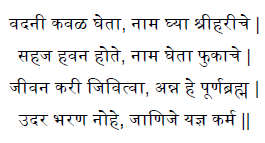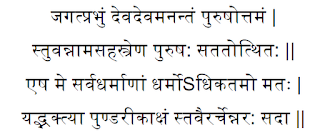For having the best experience during family and societal life, sanatana dharma recommends to follow chaturvarnashram paddhati – system of four ashramas or four stages of life (bramacharyashram – a stage of student, gruhasthashram – a stage of family man, vanaprasthashram – a stage of reclusion and sanyasashram – a stage of renouncement) and four varnas to be followed during gruhasthashrama stage (brahmin – a role of teacher, kshatriya – a role of protector, vaishya – a role of professional and shudra – a role of serviceman). This system is currently in doldrums due to the failure to understand the goals and benefits of this system. This system is meant to maintain harmony in families and society. However, there is a complimentary practice that is required while following this system and that is - the practice of performing yadnya – making offerings to god of fire through a process of havan – instantiating a fire and then making offerings. It is yadnya that really binds all in love and harmony. Yadnyakunda – a structure where fire is instantiated for performing yadnya - in a temple, is a very important and pious place. Yadnyas performed in temples help maintain harmony in society.
Out of love for all fellow beings, sages and saints researched about yadnya and found simpler ways of performing it for individuals.
The most joyful activity common to all is eating, is it not? They say, this action of eating can be transformed into yadnya by simply chanting the name of Lord Vishnu – be it Shrihari, be it Shriram or be it from thousands of His holy names. The fire in the belly that inspires one to eat is nothing but a form of God – Vaishwanar. By chanting the name of god while eating, one automatically performs a process of havan and hence it results in performing yadnya. Whereas yadnyas performed in temples help bring peace in society in general, yadnya performed by chanting name of god helps individual to find fulfillment of life. For an individual, Yadnya helps to develop detachment by developing attachment to God. Detachment breeds mental peace much required not only here but hereafter as well. That’s why they recommend developing detachment slowly from the early age of life so that one can enjoy all pleasures of life yet be detached from the world, making leaving this world painless. The more a person is detached and hence at mental peace, the more are chances of not committing any sin and hence, more are chances of not getting entangled in the cycle of going through 84 lakh types of births.
They say that the achievement of detachment and the mental peace finally helps at the time of the last moment.
Families, friends, wealth are all good and give joy only till last breath. However none of these can accompany at last moment. At the last moment when eyes are losing their ability to see, the tongue is losing its ability to utter a word, ears are losing their ability to listen any word, there is nobody, but only Self and the King of Death. In worldly affairs one may receive company and help from the families and friends, but during encounter with Yama, King of Death and Yamadutas, Yama’s army, there is nobody to give the company. That encounter has to be faced alone. The practice of chanting name of God incessantly and the mental peace achieved through that practice are the weapons that help to face that encounter and make it a friendly encounter.
Blessings received through sincere service to Guru help in long way to get firmly established in practice of chanting the name of God.









